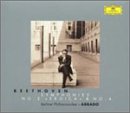| All Artists: Ludwig van Beethoven, Claudio Abbado, Berlin Philharmonic Orchestra Title: Beethoven: Symphonies Nos. 3 "Eroica" & 4 Members Wishing: 0 Total Copies: 0 Label: Dg Imports Release Date: 4/9/2002 Album Type: Original recording reissued, Import Genre: Classical Styles: Historical Periods, Classical (c.1770-1830), Symphonies Number of Discs: 1 SwapaCD Credits: 1 UPC: 028947148821 |
Search - Ludwig van Beethoven, Claudio Abbado, Berlin Philharmonic Orchestra :: Beethoven: Symphonies Nos. 3 "Eroica" & 4
 | Ludwig van Beethoven, Claudio Abbado, Berlin Philharmonic Orchestra Beethoven: Symphonies Nos. 3 "Eroica" & 4 Genre: Classical
|
Larger Image |
CD Details |
CD ReviewsOne of the highlights of Abbado's Berliner Philharmoniker Be John Kwok | New York, NY USA | 02/04/2007 (5 out of 5 stars) "Critics and fans alike have correctly praised Abbado's recent Berliner Philharmoniker cycle of the Beethoven symphonies as among the best available. Indeed, it is a radical departure from his earlier 1980s cycle with the Wiener Philharmoniker, which many thought was more pedestrian in both style and execution. Not only has Abbado considered current period instrument practice in this cycle, but more importantly, his is the first orchestra on a major recording label (Deutsche Grammophon) to use the Barenreiter Edition of Beethoven's symphonic scores, which were edited by the late Jonathan Del Mar, taking seriously Beethoven's metronome markings. Hence, people who haven't heard a performance of these symphonies will be surprised by the relatively swift tempi, and yet, neither Abbado nor the Berliner Philharmoniker seem extremely rushed in their playing; the music flows effortlessly, performed with ample brilliance by the strings, winds, and horns. Abbado's exciting, exhilirating account of the 3rd Symphony is truly a most memorable one, and, I believe, superior to Karajan's 1980s Deutsche Grammophon digital recording with the Berliner Philharmoniker (The latter is still available on CD and remains one of the best recordings of this symphony.). His interpretation of the 4th Symphony is equally just as fine too. Sound quality purists may quibble about the quality of this recording, which does sound full-bodied, but a slightly lower decibel level than what I've heard in other, previous recordings of both symphonies (If this does pose a problem, then I recommend acquiring Haitink's glistening recent account on the LSO Live label in Hybrid SACD format which I've reviewed elsewhere at Amazon.com.)." An excellent "historically informed" Eroica Santa Fe Listener | Santa Fe, NM USA | 10/09/2005 (5 out of 5 stars) "Abbado became a convert to the notion, first sponsored on disc by Roger Norrington and John Eliot Gardiner, that Beethoven's extreme metronome markings, not taken seriously for almsot 200 years, were not mistaken. However, there is one huge difference between Abbado and his predecessors: he is a great conductor leading a world-class orchestra. Even though he takes much faster speeds in the slow movement and finale of the Eroica, his musicians aren't scrambling. They seem elaxed at any speed, and their ensemble is flawless. The Fourth Sym. is performed closer to the tempi we are used to, a touch accelerated in the first movement and finale.
So, if you want this approach, compared to any previous historical set, including the recent best-selling Zinman cycle from Zurich, Abbado's is a top choice (some people, like the other reviewer here, prefer Harnoncourt's more biting, sometimes eccentric view.) But hearing music that used to be considered profound flow by like a fast-running brook still sounds strange to me. It may be "historical" to go at these speeds with a smaller orchestra and less vibrato in the strings, but I miss the passion, heroism, and grandeur of Beethoven--fortunately, it can still be found on hundreds of recordings. A note on the sound: complaints about the strings being distant, scrawny, or muffled seem wrong to me. This isn't a close-up recording, but it is eminently full and clear given the smaller orchestra. However, the recording level is about 7 db lower than usual for classical CDs." |

 Track Listings (8) - Disc #1
Track Listings (8) - Disc #1